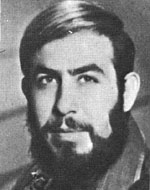Hagiladi, Yigal
Son of Eliyahu and Gracia Born on February 15, 1941 in Cairo, he immigrated to Israel with his family in 1949. The family settled in Be’er Sheva and Yigal began his studies at the Masada elementary school, He completed his studies at the Eshel Hanasi Agricultural High School at the Flugot Junction, where he was a gifted and disciplined student and was admired and loved by his teachers and classmates, and was a member of the Scouts youth movement. Commanders in the Gadna. Was an excellent sniper and participated in many sniper competitions. Yigal loved the country’s landscapes and toured its various areas. He loved nature and especially the sea. On his many walks, he collected hors d’oeuvres, pottery, pebbles and everything else that came his way, and brought them home. In 1963, Yigal married Yehudit and their first son Eliad was born. In 1971 he had another son – Guy. He loved his sons and boasted of them. His conversations with them were like adults, and he always worked on growing and growing them in appropriate conditions. He became his mother as a second husband, took care of everything she wanted, and visited her. He loved his brother and sister very closely and kept them in close contact. Yigal was very fond of all those around him, excelled in leadership and high spirits. Yigal was drafted into the Israel Defense Forces in April 1960 and volunteered for the Navy, where he joined the regular army and went on to serve in the infantry, in an intelligence unit, during the Six Day War (in the area of Abu Ruds) and during the Yom Kippur War (On the banks of the Suez Canal), during which he served as the governor of Abu-Rhodes, and served in Jerusalem for two years, and served as deputy governor of the Tulkarm district, where he served as a dedicated and loyal soldier. In the ranks of the rank and file, and around him – his commanders and subordinates – loved him and admired him. The IDF. On the 27th of Shvat, 5768 (February 3, 1978), Yigal fell while serving. He was laid to rest in the military cemetery in Beersheba. He left behind a wife, two sons, a mother, a sister and two brothers. In a letter of condolence to the bereaved family, the unit commander wrote: “Major Yigal stood out among all the officers of the military government as a professional officer, who knows his work well. He did not regard his role as merely a role or a job to be performed. He tried and even managed to reach a rare level of knowledge and professionalism. Yigal specialized in the life of the Bedouin and knew the population of the county and its way of life thoroughly and deeply – characteristics that characterized him in all his actions. The sympathy, the special respect and appreciation accorded to them by the district soldiers, by civilian elements connected with the government and even by the local civilian population – but deepened our sorrow at his departure from us. The appreciation and appreciation of the late Yigal derived from his special character, his sensitivity to those around him, the gentleness of manners and manners that he showed naturally and with respect for others and the love of man and nature, who knew no boundaries and brought him close to him. It was natural that this room soon became a committee and a focal point, a significant part of the only reality that we will now lack. ” After his death, his sister Sarah wrote a poem in his memory, ending with the words: “And the wound is not in the earth but in the Lev / his memory and his beauty will never be exhausted from the Lev of his acquaintances.”
